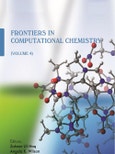Frontiers in Computational Chemistry presents contemporary research on molecular modeling techniques used in drug discovery and the drug development process: computer aided molecular design, drug discovery and development, lead generation, lead optimization, database management, computer and molecular graphics, and the development of new computational methods or efficient algorithms for the simulation of chemical phenomena including analyses of biological activity.
The fourth volume of this series features four chapters covering natural lead compounds, computer aided drug discovery methods in Parkinson’s Disease therapeutics, studies of aminoacyl tRNA synthetase inhibition in bacteria, computational modeling of halogen bonds in biological systems and molecular classification of caffeine and its metabolites.
Table of Contents
Chapter 1 Natural Lead Compounds And Strategies For Optimization
Chapter 2 Computer-Aided Drug Discovery Methodologies In The Modeling Of Dual Target Ligands As Potential Parkinson’S Disease Therapeutics
Chapter 3 Molecular Studies Of The Inhibition Of Aminoacyl Trna Synthetases In Microbial Pathogens
Chapter 4 Advances In The Computational Modeling Of Halogen Bonds In Biochemical Systems
Chapter 5 Molecular Classification Of Caffeine, Its Metabolites And Nicotine Metabolite
Subject Index
Author
- Zaheer-Ul-Haq
- Angela K. Wilson









